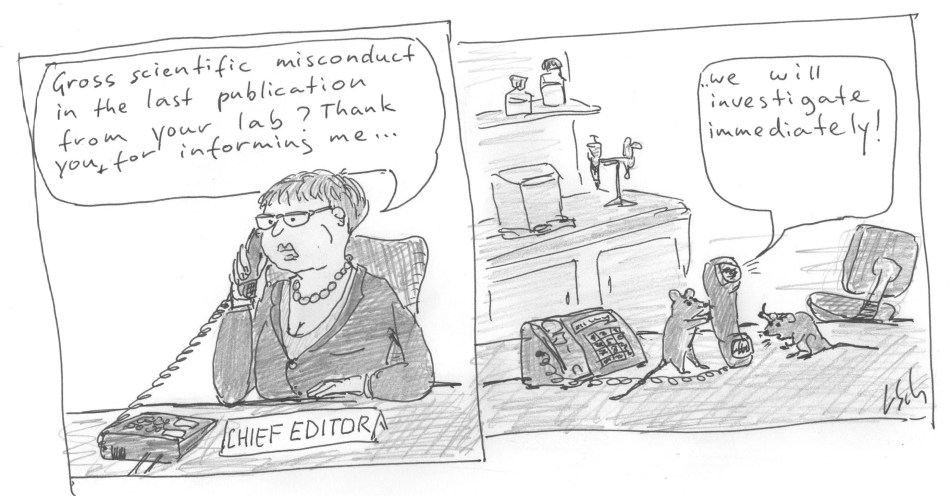On March 22nd, Tom Reller, Head of Global Corporate Relations for the publishing giant Elsevier, declared the often criticised and occasionally reviled Dutch conglomerate to be “4th largest open access publisher” and announced: “we will continue to produce that highly relevant academic and professional research and knowledge”.
Today, on April 1st, Reller explained how exactly Elsevier aims to deliver on its promise. He stated:
“The new Elsevier will not be the greedy and unscrupulous monster of the past, but an open and transparent publisher every true scientist will be proud to work with. There will be no tolerance for research irreproducibility, misconduct and data manipulation at Elsevier from now on. The times, where dishonest scientists could safely rely on our quasi-official policies of looking away and cover-up are over. We will be revising all evidence on PubPeer and elsewhere, which we previously only used to laugh at, and we will correct all problematic literature accordingly. We will demand unconditional sharing of original research data and we will call out research misconduct for what it is. There will be many retractions coming”.

When asked about specific examples, Reller called to memory such “outrageously neglected cases” at Cell Press, where not even tiniest errata were issued on papers known to contain manipulated data. Reller specifically named the scientists Olivier Voinnet, Maria Pia Cosma, Sonia Melo, Angelo Vescovi and Susana Gonzalez, whose papers in Cell and other major journals of Cell Press were in the urgent need of proper investigation, after months and even years of deliberate editorial disinterest. In this regard, Reller announced that Elsevier will be making key changes in its personnel. Emilie Marcus, Editor-in-Chief of Cell, has been sacked with immediate effect. In fact, proceedings into the termination of her contract with Elsevier began already in summer 2015, when Marcus published a blog post where she seriously asked:
“So, what do we do with this 2005 paper with lots of “little” issues [spliced western blots, “stock” loading controls, band duplications; -LS], none of which are clear fraud or deceit? The science still appears to stand and be valid, but the data as published do not accurately represent the data as collected”.
Marcus’ last blunder towards her sacking was her follow-up blog, where made clear she considers to make research misconduct into a pre-requisite to publishing in Cell, provided it is well hidden and saves her the trouble of dealing with annoying whistle-blowers:
“Sloppiness, inattention, ignorance of the guidelines, making things look pretty, cutting and pasting willy nilly—none of these may change the validity of the science, but they weaken its credibility […]. And do we really want the “correction/retraction” pages of journals to begin to outnumber the pages of exciting new science?”.
Also, Reller recalled the problems with Elsevier’s lead medical flagship journal The Lancet, by now infamous for its epic resistance to deal with problematic clinical research. On behalf of Elsevier, Reller declared that such fraudulent farce as Wakefield’s autism-through-vaccination paper and the outrageous cover-up of Wakefield’s misconduct by The Lancet’s Editor-in-Chief Richard Horton will never happen again. Most recently, Horton’s pathetically deliberate inaction in the PACE trial data sharing controversy and his inexplicable and blatant siding with the disgraced surgeon and The Lancet author Paolo Macchiarini made his position inside the new Elsevier untenable. Reller quoted how Horton used to slam the Karolinska investigation into Macchiarini’s medical misconduct and patient deaths as
“a flawed initial inquiry completed by a single individual with widely disseminated, damaging, and mistaken findings […]. Dragging the professional reputation of a scientist through the gutter of bad publicity before a final outcome of any investigation had been reached was indefensible”.
In this regard, Reller announced that Horton has been sacked as Elsevier’s medical editor due to his apparent disregard for the interests of the patients.
Finally, Reller announced that all Elsevier journals will be leaving the Committee on Publication Ethics (COPE), because “the new Elsevier does not want to risk the danger of contaminating its new ideals of research and publishing integrity by associating with certain other COPE members”.
Neither Marcus nor Horton could be reached for a comment, but rumours go they were already offered senior positions with the Swiss elite predatory publisher Frontiers.
This is an April 1st satire post. I wish though that what I made up were true, and what is actually real, were a joke instead.

“And do we really want the “correction/retraction” pages of journals to begin to outnumber the pages of exciting new science?”.
Brilliant. First time I see Editor who openly admits that most of dicoveries published in their journal is crap. 🙂
LikeLike
Perhaps they could join Sepp Blatter in whatever new venture he embarks on?
LikeLike
Pingback: A personal tale of scientific misconduct – For Better Science
Pingback: With Voinnet and Cosma cover-up, Cell now admits they have no editorial integrity whatsoever – For Better Science
Pingback: Does The Lancet care about patients? – For Better Science